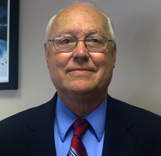Students interested in coastal natural disasters can soon pursue specialized concentrations within the doctoral engineering degree program at Jackson State University (JSU).
Through the Coastal Resilience Center of Excellence (CRC) project “PhD in Engineering (Coastal Engineering and Computational Engineering concentrations) at an HBCU,” Principal Investigator Dr. Robert W. Whalin is forming the first PhD Engineering degree concentrations focusing on coastal natural disasters within the Historically Black Colleges and Universities academic community.
Two new concentrations, Coastal Engineering and Computational Engineering, each focusing on hurricanes and floods, will be added to the PhD Engineering degree program at JSU.

Dr. Whalin said the program will prepare new engineering scholars in the field of coastal resilience and will help increase diversity in the greater homeland security enterprise. Building education programs at HBCUs like Jackson State University, where about 90 percent of students identify as African-Americans, can help reverse their underrepresentation in the engineering profession, he said.
“The 15 HBCUs with ABET accredited engineering programs graduate about 1 percent of BS engineers nationwide while graduating about 22% of African-American BS engineers nationwide,” Dr. Whalin said. “If the nation has any expectation of successfully addressing the underrepresentation of African-American engineers, the solution must strongly depend on increasing engineering programs and graduates at HBCUs.”
The Computational Engineering concentration is already listed in the school’s graduate catalog, while the Coastal Engineering concentration is expected to be added this year. Four current graduate students plan to enroll in the Coastal Engineering concentration immediately after its launch, Dr. Whalin said, and the program’s first graduate is expected in 2018 or 2019. After that, the program is projected to graduate about one to three doctoral students annually.
Strengthening engineering at JSU
The doctoral engineering project builds off undergraduate and graduate coastal natural disaster focused courses and concentrations Dr. Whalin developed through the Coastal Hazards Center of Excellence, a DHS Science & Technology Directorate Office of University Programs-funded center that preceded the CRC.
The MS Engineering degree program offers Coastal Engineering and Computational Engineering, among nine concentrations. Classes include “Linear Theory of Ocean Waves,” “Spectral Wave Analysis,” “Advanced Design for Breakwater Rehabilitation,” “Coastal Structures,” and “Prestressed Concrete Design.”

Overall, engineering programs at JSU have been growing since the first students graduated from the BS program in 2005. Today, JSU is one of five HBCUs with a “Doctoral Universities: Higher Research Activity” designation from the Carnegie Classification of Institutions of Higher Education.
“Engineering graduates command, I am sure, the highest salaries among JSU majors and likely the most job opportunities per graduate among all majors,” Dr. Whalin said. “For those with an engineering career interest and the dedication necessary to succeed in an engineering major, an exciting and rewarding career awaits our engineering graduates.”
Summers are particularly busy for JSU engineering students, who often secure internships at academic institutions and government agencies.
Last year, three JSU CRC graduate students traveled to The Netherlands, where they and nine other US graduate students spent 10 days gathering data, touring flood protection projects and speaking with Dutch professors and engineers about their experience with flood protection projects. Each prepared research papers upon their return.
“It was a most unusual, unique and rewarding educational experience for U.S. graduate students,” Dr. Whalin said.
The international research experience will continue through summer 2020 with students from four universities competing for 12 spots on The Netherlands research experience.
An education focus at CRC
In addition to leading programs at JSU, Dr. Whalin serves as the CRC Education and Workforce Development Director, overseeing seven CRC education and workforce development projects across the country.
If the nation has any expectation of successfully addressing the underrepresentation of African-American engineers, the solution must strongly depend on increasing engineering programs and graduates at HBCUs.
Each education project creates new degree concentrations, strengthens the coastal natural disaster focus of an existing degree program, develops resilience related certificates or offers new coastal resilience-related courses. The projects approach coastal resilience from a variety of academic disciplines, including engineering, computer science, geography, social science, project management and planning.
There is a strong focus on serving minority students within the CRC Education and Workforce Development program with three projects based at HBCUs and one at a Hispanic-Serving Institution, and each is led by a prominent faculty member (a dean, two department chairs and a senior professor) at their respective universities.
Dr. Whalin said these distinctions make the CRC Education and Workforce Development projects somewhat unique in both composition and organization prominence at their respective universities relative to other DHS Centers of Excellence.
“This level of university leadership ensures the prominence and importance of CRC Education and Workforce Development (E&WD) programs at each of the seven universities,” Dr. Whalin said. “There is a close linkage of E&WD projects with the research projects – students from the education universities have summer research experiences at a research university and research PIs give lectures at E&WD universities.”
